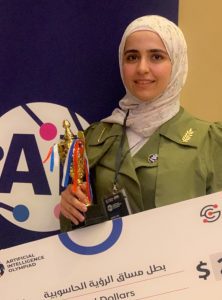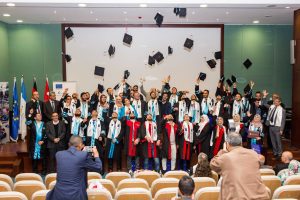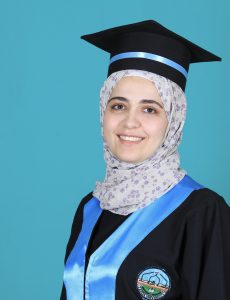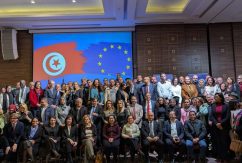Aseel: From Syria to Jordan and from adversity to success
Ambitious and courageous, Aseel el-Khalaf is a young Syrian woman who never gives up. After many ups and downs, she overcame the obstacles in her path to realise part of her dream: to land a remote job at Virginia Tech University in the United States.

Born in Syria, Aseel comes from a large, modest family. Her parents were firm believers in the importance of education and always ensured that their six children continued their studies and succeeded. In 2013, just as Aseel was about to start university, the family was forced to move to Jordan. A real setback for the young woman who has always excelled in her studies and who could already see herself pursuing a brilliant career at university.
On the road to success
The family took refuge in Jordan where they built a new life. But for Aseel, the dream of going to university was still out of reach, because tuition fees are still high for non-nationals. However, her father, a construction worker, promised to enrol his children in university in turns. As the fourth of her siblings, the young woman had to be patient, hold on to her dream and keep up her motivation. To achieve this, she resorted to a clever ruse. Retaking the baccalaureate every year as an individual candidate with the hope of one day going to university. “I knew it was going to be a long road, but I never doubted,” she recalls. While continuing with her studies, Aseel rolled up her sleeves to help her family. “I worked in a bakery, then set up on my own, making bread and cakes at home. I did it with a heavy heart because I had other aspirations. I have a lot of respect for all artisans, but I saw myself elsewhere, pursuing a brilliant career. As a studious, hard-working student, often top of my class, I told myself that I deserved better, much better,” she confides.

Never giving up
Thanks to her perseverance and the European Union’s EDU-SYRIA project, Aseel joined the University of Al Zarqa in 2019 and graduated with a degree in artificial intelligence. EDU-SYRIA is an educational and humanitarian project funded by the European Union through the EU Regional Trust Fund in response to the Syrian crisis (MADAD Fund) and the European Neighbourhood Instrument (ENI), to award higher education scholarships to conflict-affected Syrians and disadvantaged Jordanians, and to support host communities in Jordan. At a certain point in my life, I felt that all doors were closed to me. Thanks to this opportunity, I was finally able to continue my studies and obtain my precious diploma. My brothers and sisters have also benefited from EDU-SYRIA scholarships, much to our parents’ delight,” she confides with emotion.

EDU-SYRIA
Salam al-Bahri, EDU-SYRIA project assistant, explains: “Granting scholarships and enabling beneficiaries to continue their studies gives them more career prospects. But that’s not all! Above all, it allows them to regain their dignity and assume control over their future. It is a global process aimed at breaking the cycle of displacement and guaranteeing a more stable and productive future for both individuals and the society to which they belong”.
Since its creation in 2016, EDU-SYRIA, a component of the European Union’s EU-MADAD programme, has supported more than 3,000 students by enrolling them in various university projects (master’s, bachelor’s, professional diploma, etc.). “The EU is one of the few donors to include higher education for Syrian refugees in the projects set up to support them. With its comprehensive approach, from early childhood development to higher education, the European Union has demonstrated real added value and filled a gap that would not otherwise have been filled”, points out Wieke Waterschoot, Director of the Education – Syria Response project at the European Union Delegation in Jordan. She adds: Only 8% of Syrian refugees go on to higher education in Jordan. This is due to a complex set of factors, including financial difficulties, lack of identity documents and proof of previous studies, institutional rigidity and the inability of Jordanian higher education institutions to absorb large numbers of refugees”.





























 Syria
Syria 


